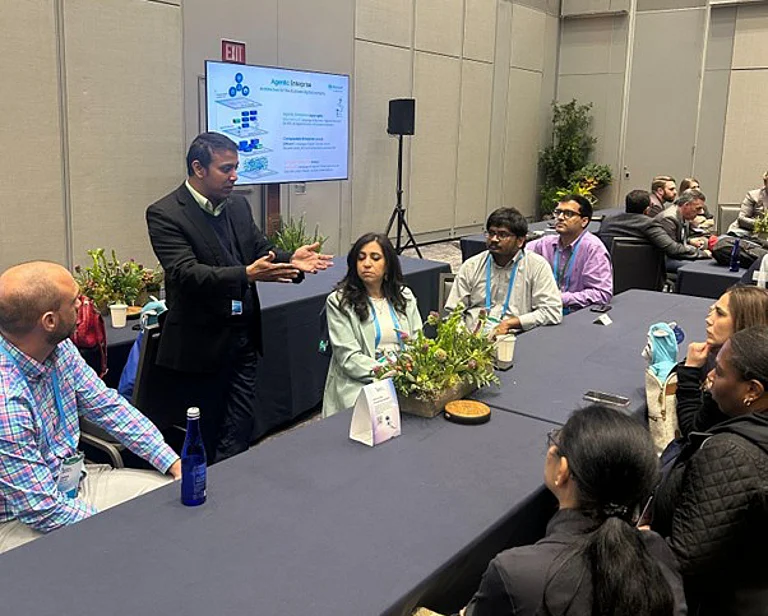As artificial intelligence continues to transform healthcare, venture capital firms are playing a pivotal role in identifying and nurturing innovations that could transform patient care. In an exclusive interview with Outlook, Rahul Agarwalla, Managing Partner at SenseAI Ventures, shares insights on AI's impact on healthcare, investment strategies, and the challenges that lie ahead.
How does SenseAI Ventures evaluate potential AI healthcare startups for investment?
We employ what we call the VDAT framework: Variety, Data, Architecture, and Team. We're particularly interested in startups that can demonstrate a tenfold improvement over existing non-AI solutions. Data integrity is paramount—we look for companies with access to clean, integrated and ideally proprietary data obtained through legal means. On the architecture front, we prioritise strong intellectual property specifically tailored to healthcare applications. The team's composition is equally crucial; we seek founders who possess both technical prowess and healthcare industry insights.
Could you share some success stories from your portfolio?
Two standout examples are Cureskin and Confido. Cureskin is leveraging AI to democratise dermatological care, making it more affordable and accessible. Confido, on the other hand, is transforming surgery centres in the United States through AI-powered automation, streamlining operations and enhancing patient engagement.
What are the biggest challenges in implementing AI solutions in healthcare systems globally?
The demand for absolute accuracy and reliability is paramount, as errors can have severe consequences. Healthcare requires an exceptionally high level of precision, particularly in critical areas like diagnostics and treatment planning. While generative AI is powerful, its probabilistic nature means responses can vary for identical queries—a concern in medical applications. In fields like psychiatry or counselling, even slight ambiguities in AI-generated language could significantly impact patient well-being.
How do you envision the role of human healthcare professionals evolving alongside AI?
AI won't replace healthcare professionals; rather, it will augment their capabilities. While AI excels at data analysis and routine processes, human expertise remains indispensable for tasks requiring empathy, critical thinking, and nuanced decision-making. Healthcare professionals will continue to provide emotional support, address complex patient concerns, and make informed judgements based on their clinical experience and intuition.
What are some ethical concerns surrounding AI in healthcare?
Privacy issues are paramount, given the sensitive nature of health data. There's also the risk of algorithmic biases in diagnosis and treatment recommendations, especially if AI systems are trained on limited or skewed data. These biases could disproportionately impact certain populations, leading to disparities in care. Additionally, achieving zero errors is challenging with generative AI, given the complexities of medical conditions and the nuances of patient care.
How is AI currently being used to develop personalised treatments?
One of our portfolio companies, Cureskin, exemplifies this trend. By leveraging advanced AI algorithms, they analyse vast datasets of patient information related to skin and hair conditions. This data-driven approach enables highly customised recommendations, empowering patients to take control of their skin health. However, we must acknowledge the challenges, particularly around data privacy and algorithmic bias. If AI models are trained on limited or unrepresentative datasets, they risk perpetuating existing health disparities.
Could you elaborate on the implications of innovations like Google's AlphaFold?
AlphaFold has been a landmark innovation in predicting protein structures with unprecedented accuracy. This capability has vast implications for healthcare, particularly in drug discovery. Understanding protein structures is essential for developing drugs that target specific pathways in the body. The open-sourcing of AlphaFold's protein structure database allows organisations globally to harness in silico modelling for drug discovery. This democratisation of data reduces barriers to innovation and could significantly accelerate advancements in precision medicine.
Looking ahead, what developments excite you most?
The next decade holds immense promise in personalised medicine, predictive analytics, and in silico drug development. AI's ability to create highly personalised treatment plans based on genetic, lifestyle, and environmental factors could transform healthcare effectiveness while reducing side effects. Predictive analytics could enable more proactive healthcare through real-time monitoring, while in silico modelling might reduce dependency on traditional clinical trials, expediting treatment development.
How might AI-driven healthcare advancements impact accessibility and affordability?
AI has the potential to democratise healthcare significantly. For instance, Cureskin's model of using AI for remote dermatological diagnosis and treatment makes expert care available regardless of location. AI can also reduce healthcare costs by streamlining administrative tasks and improving operational efficiencies, ultimately lowering expenses for both providers and patients.
What regulatory changes are needed to fully realize AI's potential in healthcare?
Several regulatory updates are essential. We need strengthened policies around data privacy and established standards for data sharing and interoperability. Regulatory frameworks must evolve to enable faster approvals for AI-driven diagnostic and therapeutic tools, without compromising patient safety. Clear guidelines are also needed to address liability issues, as the line between machine and human accountability in healthcare decisions can often be complex.


























